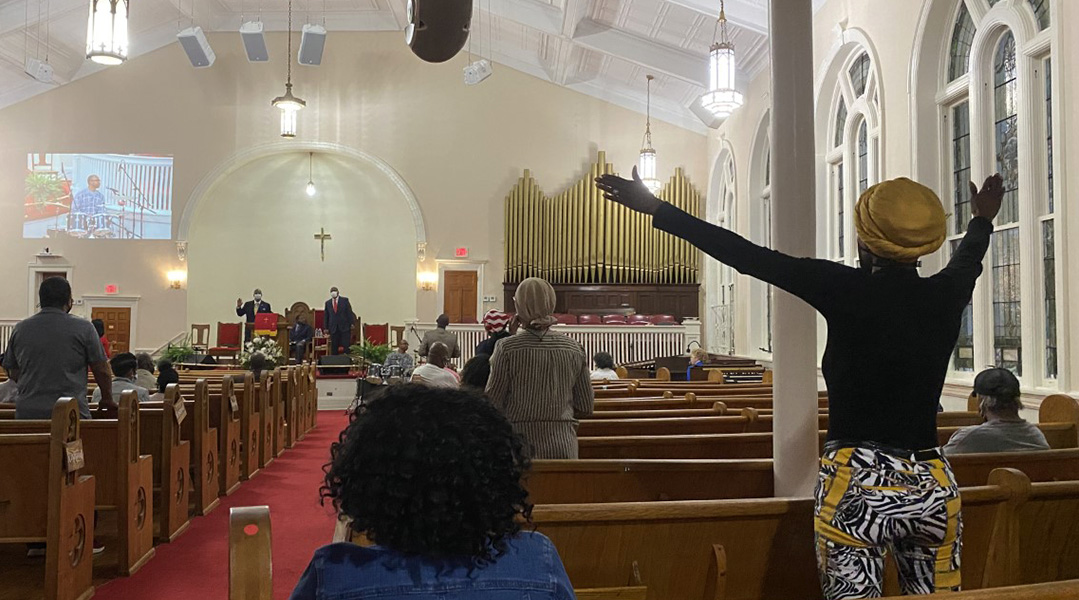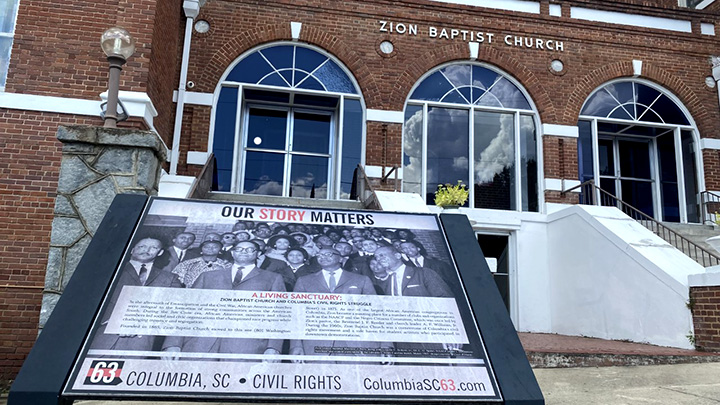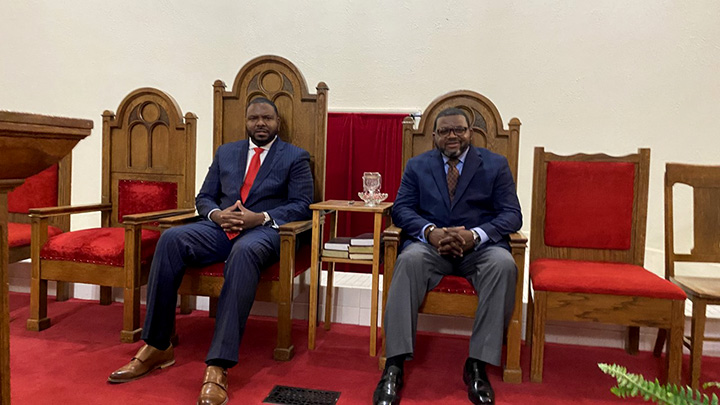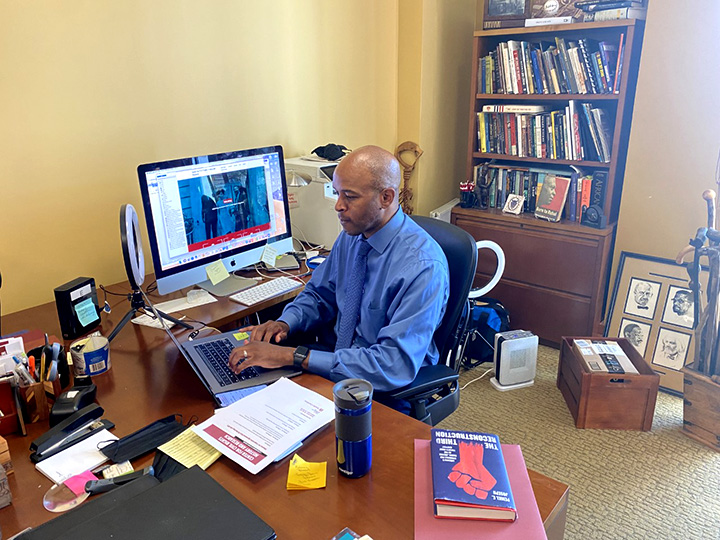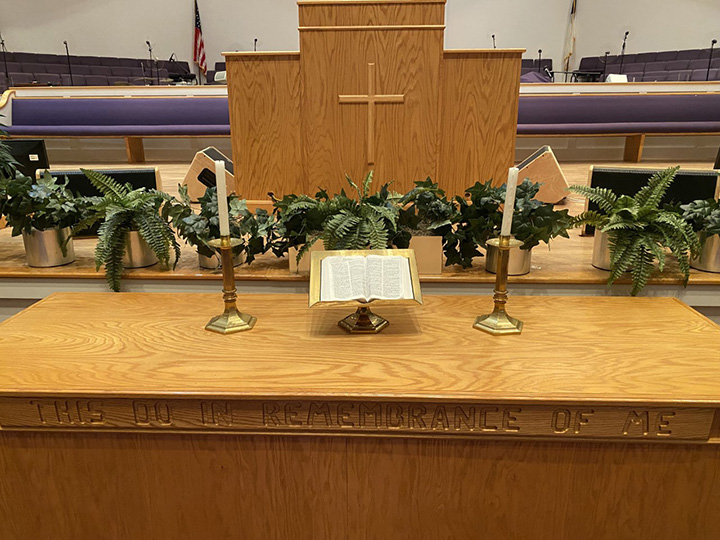Members of Zion Baptist Church attend a Wednesday Bible study. (Photos by Shakeem Jones)
During a recent Wednesday night Bible study at Zion Baptist Church, the Rev. M. Andrew Davis challenged the 50 people in attendance. He said a year from now he wants attendance doubled.
Zion Baptist, along with other historic Black churches in Columbia, has experienced declining membership over the past 70 years. Now, some of those churches are looking to refocus and rebuild membership as COVID restrictions are lifted.
Continuing hybrid services might be a part of the solution, some pastors say.
The church’s membership has been in decline for decades. Davis said in the 1950s and 1960s, membership was around 1,500, while pre-pandemic membership in 2019 was around 175. The pandemic only made a bad situation worse.
“For two years, I had to preach to a large audience I could not see,” Davis said, referring to online viewers. “There were times I had to literally encourage myself because I’ve had no one to say, ‘amen,’ no one to kind of smile, pat you on the back. It was almost like I was in a place of isolation.”
But it didn’t used to be. Zion Baptist Church was founded in 1865, just after the Civil War ended, somewhere on the 1400 block of Gadsden Street, according to the church’s website. The exact location is unknown.
Dr. Matilda Evans, the first African-American woman licensed to practice medicine in South Carolina, operated a free clinic in the basement of Zion starting in 1930.
Bobby Donaldson, director for the Center for Civil Rights Research at the University of South Carolina, said Zion was a key civil rights sanctuary during the 1940s, 1950s, and 1960s.
Davis says Zion was used as a meeting hub to plan sit-ins and address voting rights.
In fact, Dr. Martin Luther King Jr. was scheduled to speak at Zion on April 3, 1968. But he wrote a letter to the church’s pastor saying he would be delayed in Memphis for a few more days.
The next day, he was assassinated.
“Because he died in Memphis, he could not make it to Columbia, South Carolina, to address several civic issues,” Davis said.
The trend of declining membership in Black churches in Columbia reflects the trend of churches nationally — regardless of race or religion. Research conducted by the global analytics firm Gallup found that in 2020 U.S. church membership among adults had fallen below 50% for the first time in the/its poll’s history. The 47% who said they were members of a church, synagogue or mosque was a dramatic drop from the 70% who said they were members just 20 years before.
COVID didn’t help.
“COVID-19 was one of the biggest times of adversity in our world in a long time,” Davis said. “The world was in anxiety mode.”
Davis’ attendance challenge came shortly after guest speaker Pastor Craig Johnson addressed Zion as part of its annual revival event. Johnson is the sitting pastor of Jehovah-jireh Baptist Church in Harlem, N.Y.
His church was at the epicenter of the Harlem Renaissance, when Black art and literature flourished in the early 1900s. Johnson said writer and poet Langston Hughes lived on the same block.
“In New York, we were ground zero at the height of COVID-19,” Johnson said. “It was a total transformation. I wasn’t even able to go to my building. For 18, 19 months, I was doing service from my living room with my family. It was culture shock for me.”
Back in Columbia, Pastor Blakely N. Scott of First Nazareth Baptist Church also dealt with the struggles of leading a church through a global pandemic.
First Nazareth, the massive church at the corner of Millwood Avenue and Gervais Street, is slowly building back its attendance. But it still isn’t where it once was. Scott says attendance for Sunday service is around 500 in-person members, plus the virtual audience.
“Before COVID, we were doing two services on Sundays with an average of 2,000 persons,” Scott said, who is in his 43rd year as pastor of the church. “Of course, when COVID hit, we went down to nothing.”
Pre-pandemic, First Nazareth held voting campaigns and provided homeless services. Both programs have been scrapped post-pandemic.
First Nazareth has what Scott calls hybrid worship, where the service is held in-person and members have the option of attending online or in-person. There is also a radio broadcast.
“We have adjusted that the hybrid method is going to be the trend of the future,” Scott said. “I had one member say to me in passing that she can get used to the way things are going now. So, I don’t think we are going to go back to the way things were.”
Zion Baptist also holds virtual service for its members. Currently, about 100 people attend in-person Sunday services, while about 50 to 75 attend virtually, Davis said. He said he remains hopeful in-person attendance will eventually grow above pre-pandemic numbers. For now, he is just grateful that Sunday service attendance is back to pre-pandemic levels.
One of the obvious problems with declining membership is declining donations: How do shrinking churches keep the lights on?
Davis said donations in 2020, the year the pandemic hit, actually increased from 2019. Most donations came from virtual attendees.
“Even though we can’t necessarily count everyone in the home, we are able to reach people we cannot see, and I do think that to a certain degree, virtual church is impactful,” he said. “And it is effective.”
With Zion Baptist operating as long as it has, Davis said the reason Zion still stands is simply God’s grace.
He said there is something unique about the Black church experience – flavor.
“We don’t just sing,” he said. “We sing in a special way. We sing in a unique way, a way that touches people’s heart, a way that raises the hair off someone’s back.”
The entrance to Zion Baptist Church
The Rev. M. Andrew Davis, left, of Zion Baptist Church, and the Rev. Craig Johnson of Jehovah-jireh Baptist Church
Bobby Donaldson, director for the Center for Civil Rights History, works inside of his office.
The center of First Nazareth Baptist Church’s sanctuary

